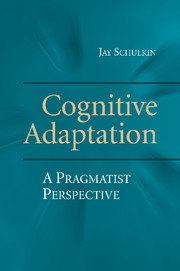Book contents
- Frontmatter
- Contents
- Preface
- Introduction
- 1 Cognitive Adaptation, Objects, and Inquiry
- 2 The Human Situation: Uncertainty and Adaptation
- 3 Time and Memory: Historical Sensibilities
- 4 Educational Sensibilities
- 5 An Instinct for Spiritual Quests: Quiet Religion
- Conclusion: Demythologized Reason
- References
- Index
1 - Cognitive Adaptation, Objects, and Inquiry
Published online by Cambridge University Press: 08 August 2009
- Frontmatter
- Contents
- Preface
- Introduction
- 1 Cognitive Adaptation, Objects, and Inquiry
- 2 The Human Situation: Uncertainty and Adaptation
- 3 Time and Memory: Historical Sensibilities
- 4 Educational Sensibilities
- 5 An Instinct for Spiritual Quests: Quiet Religion
- Conclusion: Demythologized Reason
- References
- Index
Summary
It is impossible to know intuitively that a given cognition is not determined by a previous one.
– C. S. Peirce, Questions Concerning Certain Faculties Claimed by Man, 1868Psychobiological propensities stem from the constraints of the human mind/brain and its computational abilities. We are born with diverse forms of cognitive abilities; there should be no mythology about this. The question is, “To what degree?” and here there are legitimate disputes. Our hypothesis-generating abilities exist in the specific culture in which we are immersed, and that shapes our thinking (Mill, 1843/1873; Peirce, 1899/1992); however, some of the categories reflect the cognitive machinations of the mind/brain and how it operates in problem solving with nature and other sentient creatures.
Common categories into which we can organize our responses are those that we inherit and those that we acquire (e.g., Carey & Smith, 1993; Gelman, 2003; Levinson, 1996, 2006; Medin & Atran, 1999). The process of evolution selected for a self-corrective capacity in our ability to get anchored to the world around us (Darwin, 1859/1958; Dewey, 1910/1965). Dewey, for example, understood that science, in part, is an extension of local adaptation or local problem solving.
This chapter focuses on the logic of inquiry from a pragmatist perspective, which, along with a cognitive and/or functional predilection toward kinds of objects, underlies the organization of action (see Johnson, 2007; Schulkin, 2004). Cognition functions in the context of adaptation and action. Cognitive systems are endemic to the organization of action, a common theme for pragmatists (e.g., Dewey, 1896).
- Type
- Chapter
- Information
- Cognitive AdaptationA Pragmatist Perspective, pp. 18 - 37Publisher: Cambridge University PressPrint publication year: 2008



